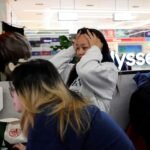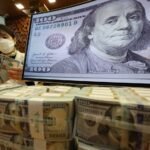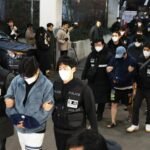
WASHINGTON D.C./SEOUL – US President Donald Trump plans to impose a 100% tariff on any branded or patented pharmaceutical products, unless a company is building a plant there, while the measure will not apply to countries with negotiated agreements with the US that contain provisions on drugs.
The move is expected to hurt the price competitiveness of South Korean drugmakers against pharmaceutical producers of countries with trade deals with Washington in the US, the world’s largest pharmaceutical drug market, industry sources in Seoul said.
“Starting October 1st, 2025, we will be imposing a 100% Tariff on any branded or patented Pharmaceutical Product, unless a Company IS BUILDING their Pharmaceutical Manufacturing Plant in America,” Trump said in a Truth Social post on Friday.
“’IS BUILDING’ will be defined as, ‘breaking ground’ and/or ‘under construction.’ There will, therefore, be no Tariff on these Pharmaceutical Products if construction has started.”
The tariffs will not apply to nations with negotiated agreements with the US that contain provisions on drugs, according to a White House official, delivering promised relief to economies including the European Union and Japan, Bloomberg reported on Saturday.
Duties on pharmaceuticals from the EU will be capped at 15% per the terms of its framework deal, Bloomberg quoted the official. Japanese drugs will also be charged the rate spelled out in its pact, the official added, according to the report. The US-Japan joint statement says American tariff rates on Japanese drugs and semiconductors should not exceed those applied to others, including the EU.
On the other hand, South Korea, the UK, Switzerland and other countries are expected to face the 100% tariff as they have not reached trade deals with the US.
KOREAN PHARMACEUTICAL STOCKS TUMBLE
Trump’s latest tariffs on pharmaceutical products slapped the stocks of South Korean pharmaceutical companies. SK Biopharmaceuticals Co. dropped 3.52%, underperforming a 2.45% loss in the benchmark Kospi.
Green Cross Holdings Corp. and Chongkundang Holdings Corp. lost 3.81% and 2.48%, respectively, while Bukwang Pharmaceutical Co. fell 2.76%.
In the junior Kosdaq market, Novarex Co. slid 3.88% and Cellbion Co. skidded 3.76%. Huons Co. and DongKook Pharmaceutical Co. declined 3.28% and 2.79%, respectively, while Telcon RF Pharmaceutical Inc. fell 3.06%.
Celltrion Inc., however, edged up as the South Korean biosimilar giant agreed to acquire Eli Lilly and Company’s plant in Branchburg, New Jersey, for about 460 billion won ($330 million).

The South Korean pharmaceutical exports to the US rose 45.1% to $1.5 billion last year, according to the Korea Health Industry Development Institute. That made up 1.1% of the country’s total sales to the US.
GENERIC DRUGS EXCLUDED
Trump’s tariffs will not apply to generic drugs, which account for the majority of pharmaceutical sales and are highly price-sensitive for consumers, as the measure is to spur corporate investments in the US, Whitehouse officials said, according to US media.
South Korean pharmaceutical makers are not the immediate target of the tariffs as most of them export drug substances rather than finished drugs while relying on local partners for sales, industry sources in Seoul said.
However, if the tariffs are later expanded to drug substances, their profits are expected to fall.
South Korean pharmaceutical makers are actively working to establish production or packaging bases in the US and secure inventory there.
Celltrion agreed to take over Eli Lilly and Company’s plant, while SK Biopharmaceuticals secured a manufacturing base in Puerto Rico, a US territory.
South Korean contract development and manufacturing organizations (CDMOs) are also mulling similar steps.
Samsung Biologics Co., which has plants only in South Korea, is considering a US plant acquisition, while its competitor Lotte Biologics Co. bought Bristol Myers Squibb’s (BMS) biologics plant in Syracuse, New York.

TARIFFS BASED ON SEMICONDUCTOR COUNT
The US is considering tariffs on imported electronic devices based on the number of semiconductors installed, Reuters reported. The move is expected to pose a threat to South Korean companies.
According to the plan, which has not previously been reported and could change, the Commerce Department would impose a tariff equal to a percentage of the estimated value of the product’s chip content, Reuters said.
If implemented, the plan would show the Trump administration is seeking to hit a wide range of consumer products, from toothbrushes to laptops, potentially driving up inflation as it seeks to ramp up U.S. manufacturing, Reuters said.
The plan is likely to hit South Korea’s exports of smartphones, PCs, TVs, refrigerators and others to the US, industry sources in Seoul said.
“America cannot be reliant on foreign imports for the semiconductor products that are essential for our national and economic security,” White House spokesperson Kush Desai responded when asked about the details, according to Reuters.
“The Trump administration is implementing a nuanced, multi-faceted approach to reshoring critical manufacturing back to the United States with tariffs, tax cuts, deregulation, and energy abundance.”
By Sang-Eun Lee, Dae-Kyu Ahn and Joo-Wan Kim
selee@hankyung.com
Jongwoo Cheon edited this article.















